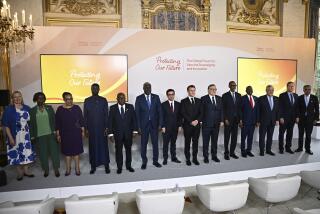Health plan focuses on training workers
- Share via
DAVOS, SWITZERLAND — A multinational health group announced here Friday that it would commit $500 million over three years to strengthen healthcare systems and train additional health workers in developing nations, addressing a key problem for implementing its vaccination programs.
The GAVI Alliance, formerly called the Global Alliance for Vaccines and Immunization, is moving to counter a massive outflow of health workers from developing nations where its training and immunization programs have proved most effective. Doctors and nurses, particularly from Africa, often seek higher wages in developed nations that also face shortages of health professionals.
GAVI is a partnership that includes national governments, the United Nations, the World Bank, the vaccine industry and the Bill & Melinda Gates Foundation. It was launched at the World Economic Forum in 2000 with a $750-million grant from the Gates Foundation, which gave the organization that amount again in 2005.
GAVI announced the move at this year’s session of the World Economic Forum, an annual gathering of businesspeople, political leaders and others to discuss international problems and their solutions.
Since its inception, GAVI has prevented 2.3 million deaths from diseases for which vaccines are available, including 600,000 lives saved last year, according to World Health Organization data released Friday. The organization said GAVI had boosted vaccination rates among African children to 73% for one or more diseases.
“We know the impact of saving those lives has a lot of other benefits,” improving standards of living and quality of life and reducing population growth, Bill Gates, chairman of Microsoft Corp. and a co-founder of the foundation, said at a news conference. “Vaccines are a miracle.”
As new vaccines are developed for tuberculosis and HIV/AIDS, training and support provided by GAVI would help developing nations deliver them, Gates said.
But as the vaccination programs proceed, healthcare systems in Africa are crumbling, partly due to the loss of medical professionals trained by global aid programs. Malawi, for example, has lost 64% of its nurses and 85% of its doctors in recent years, many going to work for aid groups or the U.S. or British governments, which pay much higher salaries than local governments, according to a recent analysis in the journal Foreign Affairs.
Dr. Tadataka Yamada, who directs the Gates Foundation global health efforts, said in an interview that the role aid agencies and developed nations play in the outflow of medical talent from poor countries may be overstated. The larger reasons may be problems in the local economies.
“If you don’t have places for physicians to work, if you don’t have salaries to pay them, then there is no place for them to go,” Yamada said.
The Gates Foundation is now seeking ways to improve conditions for local health workforces, he said.
“How do we create opportunities for this diaspora to come home?” Yamada asked.
Julian Lob-Levyt, executive secretary of GAVI, called the problem in sub-Saharan Africa, where millions of children still die each year of diseases preventable with vaccine, a “capacity crisis.”
He said the effort announced Friday was a tactical response.
“Instead of just training sophisticated doctors and nurses, we will train paramedics” to administer vaccines, Lob-Levyt said in an interview. The technicians would be more cost effective to train and support, he said, and would more likely remain in their home nations because their skills would not be in demand in wealthier nations.
One such model may come from Ghana, Ann M. Veneman, executive director of UNICEF, said in an interview.
“They put together a vocational program for community-based health workers” who can give immunizations and basic care, she said, adding that the program offers an incentive for advancement once the workers become ensconced in local jobs.
GAVI has raised $3.8 billion, nearly all from the Gates Foundation and national governments, and hopes to raise $1.3 billion more by 2015. The $500-million effort, which also will address systems to distribute vaccines and drugs, needs new cash infusions from governments, Lob-Levyt said.
More to Read
Sign up for Essential California
The most important California stories and recommendations in your inbox every morning.
You may occasionally receive promotional content from the Los Angeles Times.













